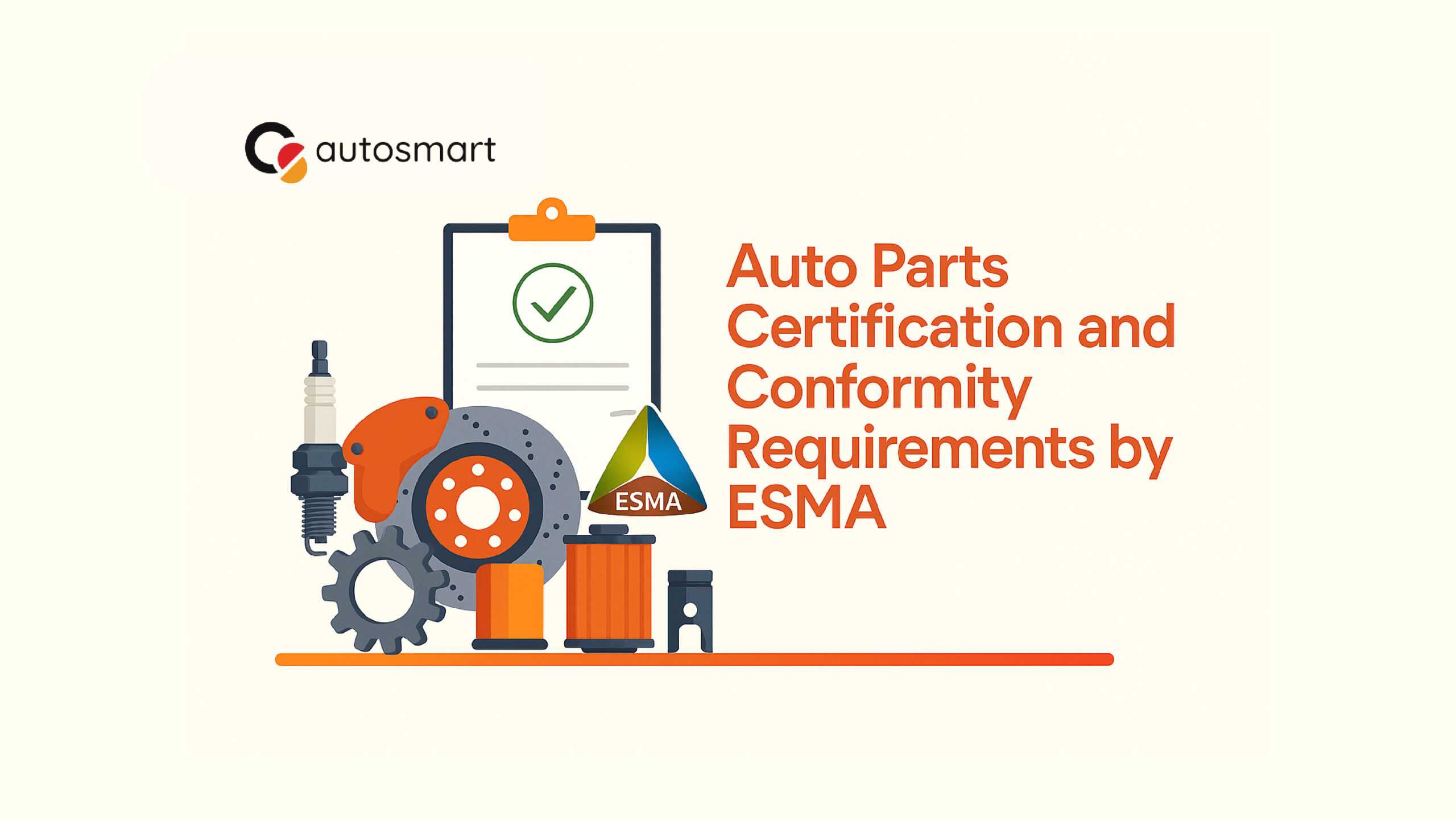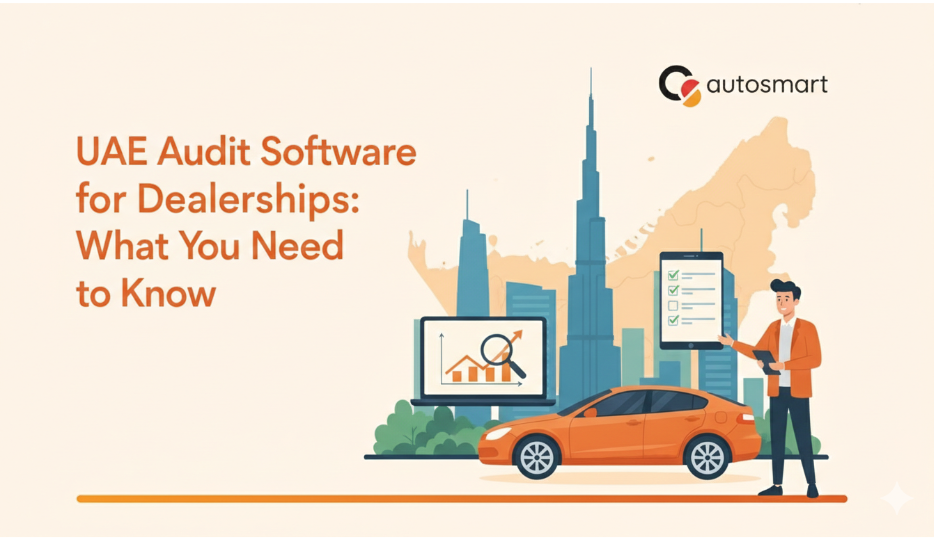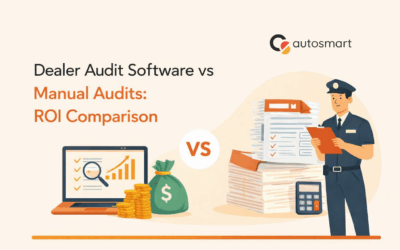Did you know that using the right vehicle spare parts in the UAE isn’t just a matter of quality but a legal requirement?
To enhance road safety and protect consumers, the Emirates Authority for Standardization and Metrology (ESMA), now operating under MoIAT, has established strict regulations for auto parts certification and conformity. These rules ensure that all regulated vehicle components used in the market meet approved safety and performance standards.
If you manage a dealership, independent workshop, or automotive service center, it’s crucial to understand how these regulations work, and how to stay compliant.
This blog will walk you through the essentials and highlight how digital tools like AutoSmart Audit can support your compliance journey.
Why Auto Parts Certification Matters in the UAE
Spare parts are more than just mechanical components, they’re essential to vehicle safety, reliability, and long-term performance. Faulty, counterfeit, or uncertified parts can lead to:
- Reduced vehicle performance
- Breakdowns or failures
- Serious road accidents
- Legal and financial consequences for workshops
To mitigate these risks, the UAE has implemented mandatory certification for a wide range of automotive components.
Key Objectives of Auto Parts Regulation in the UAE:
- Prevent the circulation of counterfeit and substandard parts
- Improve road safety
- Enhance consumer trust in certified automotive services
- Support fair competition through standardized quality benchmarks
What Is a Certificate of Conformity (CoC)?
CoC is an official document issued under the Emirates Conformity Assessment System (ECAS). It verifies that a specific automotive part has been tested and meets the technical, safety, and environmental standards defined by UAE regulations.
Manufacturers, importers, or distributors are required to:
- Submit parts for evaluation to accredited testing laboratories
- Receive a CoC upon successful verification
- Ensure the part carries the appropriate markings or labels, such as the Emirates Quality Mark (EQM)
A valid CoC is typically issued for a period of 1 to 3 years and may need renewal, especially when regulatory updates occur or product designs change.
Commonly Regulated Auto Parts Include:
- Brake pads and brake system components
- Steering and suspension systems
- Exterior and interior lighting systems
- Fuel and air filters
- Seat belts, airbags, and other safety-critical components
Using these parts without a valid CoC can put your business and your customers at risk.
The Risks of Using Non-Certified Parts
Failing to comply with parts certification regulations can result in severe consequences for automotive businesses in the UAE.
Potential Penalties Include:
- Fines for each violation
- Confiscation of uncertified parts
- Suspension of import licenses or trading permits
- Loss of reputation among clients and insurers
Moreover, the use of faulty or uncertified parts could contribute to accidents, leaving your workshop legally liable and damaging your credibility in the market.
AutoSmart Audit: Simplifying Parts Conformity Management
AutoSmart Audit is a digital platform designed to streamline how automotive businesses manage parts compliance. It allows users to:
- Receive automatic alerts when certifications are about to expire
- Prevent uncertified parts from being used in repair workflows through system checks
- Generate reports during regulatory audits or internal reviews
- Maintain consistency across multi-branch operations
Whether you’re overseeing a single garage or managing a network of workshops, AutoSmart Audit helps you ensure that only approved, certified components are in use, backed by clear documentation and real-time alerts.
By integrating such tools, workshops can shift from reactive to proactive compliance management, saving time, reducing risk, and improving efficiency.
Business Benefits of Compliance
Key Advantages:
- Customer Trust: Clients will revisit and refer others when they know certified, high-quality parts are used.
- Smooth Insurance Processes: Claims are often processed faster when certified parts are used in accident repairs.
- Positive Brand Image: Position your workshop as a safety-first, standards-driven business.
- Audit Preparedness: Be ready at all times for inspections, reducing stress and downtime.
الخلاصة
In the UAE, ensuring parts certification and conformity is essential. These regulations protect customers and elevate service quality.
By combining best practices with smart tools like AutoSmart Audit, you can ensure that your business remains fully aligned with UAE regulations, efficiently and confidently.
Disclaimer: This content is for general purposes only. AutoSmart Audit is not associated with ESMA or any of the regulatory bodies listed.

نصيف عمر هو المؤسس والرئيس التنفيذي لشركة AutoSmart Technology، وهي منصة SaaS تعمل على رقمنة عمليات التدقيق لمصنعي المعدات الأصلية والموزعين وشبكات الوكلاء. بفضل خبرته السابقة في شركة تويوتا (عبد اللطيف جميل) وخبرته في مجال تكنولوجيا المعلومات والإدارة الصناعية، يكتب عن عمليات التدقيق والانضباط التشغيلي وتطوير منتجات SaaS للعملاء من الشركات في مختلف الأسواق.




